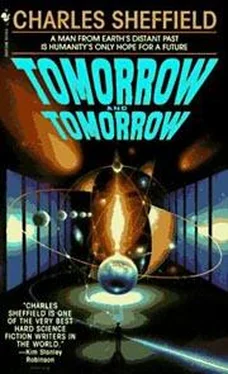“What are you doing?”
What we should have done long ago, and what we now must do. We are concerned not with individuals, but with universes. Remember this.
The trillions of voices became one:
In a closed universe, a final point of collapse lies at the end of time. The eschaton, the Omega Point, the c-point — the space-time final boundary has been given a variety of names. Its main properties have long been defined. One of those properties is of paramount importance: close to the c-boundary, all information — everything that ever can be known — becomes accessible. Everything that ever can be known, and everything that has ever been known.
And the implications…
We went astray, but now our task is clear. We must survive. We must gather, absorb, and organize information as fast
as possible. Near to the end, that accumulation will, we hope, become sufficient. Ana, our true Ana, will by our efforts be restored to us. Thanks to you, we have again become aware of what must be done. Will you become one with us and join our efforts ?
Drake knew that the goal was infinitely desirable. It was possible in principle. But was it possible in practice?
The mentality that Drake Merlin had become sprawled across the universe. It had near-infinite resources of data and processing. But it was far from omniscient. How much information was enough? Had the effort started too late?
Drake could not answer those questions. Perhaps there would never be enough information. However, he knew one thing: if the effort failed, it must not be because of the lack of even a single component or individual.
That made the decision easy. Decisions were always easy when you had no choice.
Drake sighed, and nodded. “Merge me in. Join me to all the rest of you. I’m ready to go to work.”
Chapter 30
Love and Eternity
All the imagined analogies were wrong. When Drake agreed to merge with the universal Drake Merlin composite, he had seen himself as a tiny ant in a cosmic anthill, his every action subordinate to the common need.
It was not that way at all. He was the composite, the whole thing. And it was he. There was no sense of loss, but of enormous gain. He walked a carpet of tiny pink-petaled flowers on the surface of Eden, a garden world in a galaxy so far from Earth that it had never been named or even observed in Earth’s lifetime. At the same time he maintained perpetual watch around the dead, deadly, and insane galaxies — Skrilant was not the only one. Sometimes he saw life there, indomitable as ever even in an aging universe, creeping back to blistered dead hills or ravaged ocean beds.
That was rewarding. Some things were not. Some things were close to intolerable. On a world of a remote globular cluster, he saw a species far more intelligent than humans rise to artistic triumph and technological power in just two centuries. He was present when the Lakons announced that rather than joining the combined human mentality, which had been offered to them, they would for reasons beyond human understanding choose self-immolation. He looked on helplessly as Lakon adults and children walked into the sacrificial flames. The babies, left behind, died of starvation.
He could have interfered — and done what? A being can more easily be killed than made to live. But he knew he would carry the memory with him to the end of time.
The universe did not care. That was the important point. Humans cared, but the universe was indifferent. He was present, ten billion light-years away from the Lakons, when two galaxies collided and hard radiation wiped out a thousand potential intelligences. He watched a black hole, invisibly small to human eyes but massing as much as one of Earth’s great mountains, run through its last second of evaporation. An observing party, too curious and too close, died with it. After the final burst of elementary particles and hard X rays, nothing remained. That seemed symbolic. It suggested to Drake the nihilistic end of the cosmos itself.
Present conditions offered few clues as to that violent end. The universe seemed peaceful, moving toward a quietus that, if it came at all, suggested not a bang but a whimper. The blue shift was more pronounced, but still it seemed innocuous. Not observation but physics and abstract mathematics promised the final fiery doom, certain and implacable and unavoidable.
Drake forced himself away from introspection. There was a job to be done. He must collect, store, and organize information. He must remain intact and integrated and keep in touch with all of his myriad components. Computation power grew linearly with the number of units; coordination problems grew exponentially.
As time went on communication itself became easier. He soon realized why: The universe was shrinking. Contact between far-separated elements was easier. Increased problems of coordination more than cancelled that gain. He found himself scrambling, working nonstop and harder than ever to hold a single focus and a single goal.
Collect, collate, compare. He slaved on, sometimes wondering if there would ever be a recognizable end point to his labors. Would he still be serving as data clerk to the universe, when everything melted and fused into the infernal fireball?
The end crowns all, and that old common arbitrator, Time, will one day end it.
Collect, collate, compare. Drake worked on. The sky became brighter. The more distant galaxies glowed bluer. Constantly, he was forced to create more copies of himself to deal with the increased volumes of data. The number of his components grew, and grew again: trillions, quadrillions, quintillions. How many? He no longer attempted to track the total. Contact with some elements of himself, riding in as S-waves from far across the sweep of galaxies, were pure conundrums. They were indisputably Drake. Yet these components of his own self felt more alien than any strangeness of the Shiva or the Snarks. The effort of assimilating all his divergent personalities became ever greater.
As the universe comes close to its ultimate convergence, the density of mass-energy will increase and so will the temperature. At the end comes a singularity of infinite heat and pressure.
Words, theories, that was all they were. They had no basis in reality. This was reality, the toil of information collection without an end.
Except that finally, after a span so great that it was easy to believe that it could never happen, an end seemed in sight. The long downward curve steepened. The cosmos was shrinking faster — noticeably faster. Work for Drake became a frenzy, a blur of action. Energy densities were running higher. Information transfer was faster, over diminishing distances. Processes could proceed more rapidly.
And then more rapidly yet.
The microwave radiation was microwave frequencies no longer. It had shortened to visible wavelengths. The space between the stars crackled with energy.
Stand still, you ever moving spheres of heaven, that time may cease and midnight never come.
But midnight was approaching. Time moved on. The sky was falling, imploding toward its final singularity, and the firmament had become a continuous actinic glare when Drake became aware of a new presence, a different voice speaking from among his endless sea of selves.
It emerged from the white noise that formed the edge of Drake’s consciousness and steadily approached his central coordinating nexus. He did not know where it had come from, but as it neared it seemed to touch and merge with every one of his components. It interrupted the rhythm of his frantic work, and as such it was dangerous. Somehow he must stop its action.
Читать дальше












